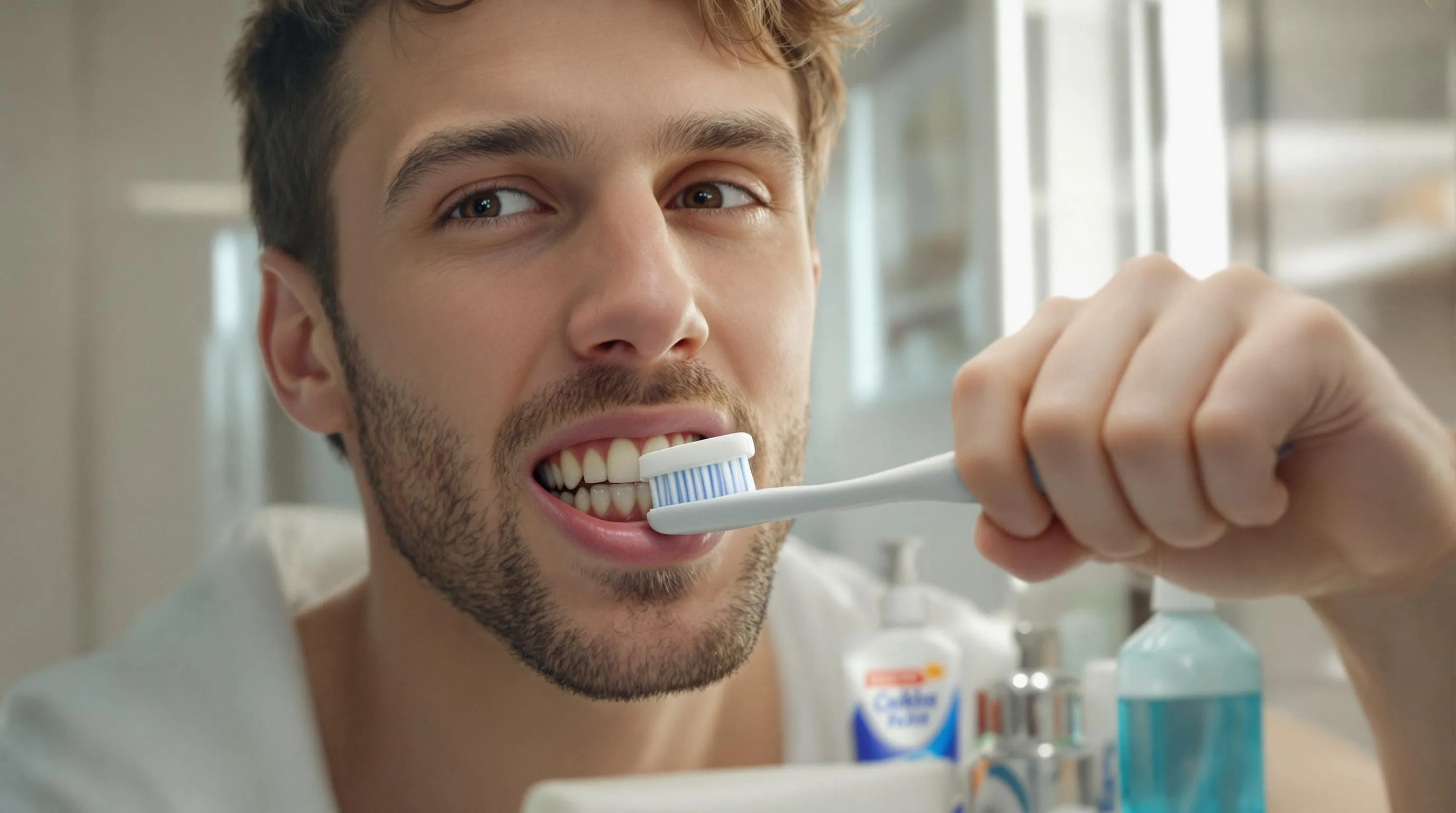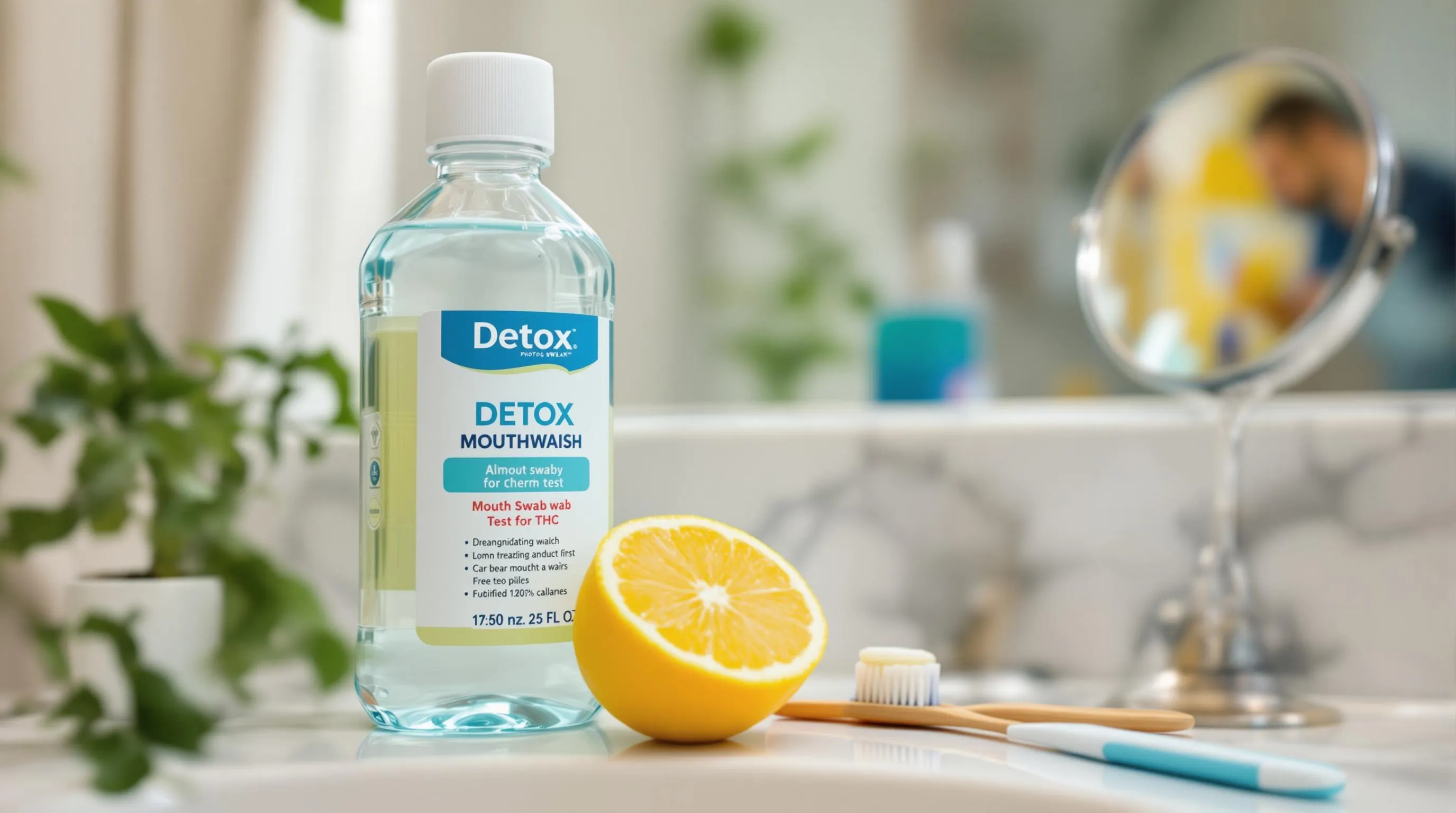How to Pass a Mouth Swab Test for THC: Proven Methods That Work

That metallic taste of anxiety hits when you realize you've got a mouth swab test coming up and you've recently used cannabis. Unlike urine tests that can detect THC metabolites for weeks, saliva tests focus on a much shorter window - typically within the past 24 to 48 hours. This narrow detection timeframe works in your favor, but timing and preparation become absolutely critical.
The good news? THC lingers in your mouth through absorption in mucous membranes, making it detectable but also manageable with the right approach. For occasional users, THC may only be detectable for up to 24 hours, while regular users might face a 48-hour window or longer depending on their metabolism and usage frequency.
Understanding these detection patterns gives you a strategic advantage in preparing for your test and significantly improving your chances of passing.
If your looking to pass quickly, check out this guide how to pass a mouth swab test in 12 hours
Understanding Mouth Swab Drug Tests
Mouth swab drug tests collect saliva samples to detect recent substance use through a simple and non-invasive process. These oral fluid screenings offer immediate results and can detect various substances within specific timeframes.
How Mouth Swab Tests Work
Mouth swab tests use a collection device placed inside your mouth to gather saliva samples from your oral cavity. The swab absorbs oral fluid containing drug metabolites that remain present after substance use. Testing facilities analyze these samples using immunoassay technology to identify specific compounds like THC.
The collection process takes 2-3 minutes and involves placing the swab between your lower cheek and gum until saturated. Laboratory technicians then examine the sample for drug metabolites using specialized equipment that can detect substances at specific concentration levels. Results typically become available within 24-48 hours for confirmatory testing.
Saliva tests detect parent drug compounds rather than metabolites found in urine tests. This detection method focuses on recent impairment rather than historical use patterns. The accuracy rate reaches approximately 90% when proper collection procedures are followed.
THC Detection Window in Saliva
THC remains detectable in saliva for 24-72 hours after cannabis use depending on consumption frequency and individual factors. Occasional users face shorter detection windows of 24-48 hours while regular users may test positive for up to 72 hours after their last use.
| User Type | Detection Window | THC Concentration |
|---|---|---|
| Occasional users | 24-48 hours | Lower levels |
| Regular users | 48-72 hours | Higher levels |
| Heavy users | Up to 72 hours | Peak concentrations |
Several factors influence how long THC stays detectable in your oral fluid:
- Consumption frequency affects baseline THC levels in your system
- Metabolism rate determines how quickly your body processes cannabinoids
- Body composition impacts THC storage and elimination patterns
- Hydration levels influence saliva production and drug concentration
Understanding these detection patterns helps you strategize effectively when preparing for how to pass a mouth swab test for THC. The shorter detection window compared to urine tests creates opportunities for successful results with proper timing and preparation methods.
Immediate Preparation Strategies

Time becomes your most valuable asset when facing an upcoming mouth swab test. These proven strategies can significantly improve your chances of passing when implemented immediately.
Stop Cannabis Use Immediately
Stopping cannabis consumption represents the most effective method to pass a mouth swab test for THC. THC remains detectable in saliva for up to 72 hours after last use, making immediate cessation critical for test success. Occasional users who quit at least 48 hours before testing typically achieve negative results, while regular users require 72 hours minimum for best outcomes.
Cannabis particles continue circulating in your oral cavity for several hours after consumption. These residues concentrate in mucous membranes and can trigger positive test results even when THC levels in your bloodstream decrease. Abstaining for 2-3 days provides the safest margin for clearing detectable amounts from your saliva.
Heavy users face extended detection windows that may require up to one week of abstinence. Your metabolism rate, body composition, and consumption frequency directly influence how quickly THC clears from your system. Document your last consumption time to calculate the appropriate waiting period before testing.
Oral Hygiene Techniques
Intensive oral cleaning removes THC particles lodged in your mouth's surfaces and crevices. Brush your teeth, gums, tongue, and roof of mouth multiple times throughout the day leading up to your test. Focus particular attention on areas where cannabis residue accumulates: between teeth, along the gum line, and on tongue surfaces.
Flossing eliminates trapped particles that regular brushing cannot reach. Use dental floss to clean between every tooth, removing any cannabis remnants that could trigger positive results. Follow flossing with thorough rinsing using alcohol-based or hydrogen peroxide mouthwash.
Hydrogen peroxide rinses effectively interfere with THC detection by adulterating saliva samples. Dilute hydrogen peroxide to 3% concentration or less, swish for 30 seconds, then spit completely. This technique temporarily reduces THC levels to undetectable amounts, though effects last only 30-60 minutes.
Chewing gum stimulates fresh saliva production while altering your mouth's chemistry. Citrus and cinnamon flavors work most effectively, as they increase saliva flow and dilute existing drug residues. Sour candies boost saliva acidity levels, creating an environment that confuses test mechanisms and reduces detection accuracy.
Hydration and Dietary Considerations
Proper hydration dilutes THC concentrations in your saliva while promoting fresh saliva production. Drink 8-10 glasses of water throughout the day before testing, focusing on continuous fluid intake rather than large quantities at once. Fresh saliva contains fewer drug residues compared to older saliva that's been sitting in your mouth.
Water and fruit juices provide best hydration without interfering with test results. Avoid dehydrating beverages like black tea, coffee, and alcohol, which reduce saliva production and concentrate existing THC levels. Maintain steady fluid intake up until 2 hours before testing to ensure maximum dilution effects.
High-fat foods bind with THC molecules and redirect them away from your saliva. Eat deep-fried foods, pizza, burgers, or processed foods containing significant fat content. These fats trap THC metabolites in your digestive system, reducing their presence in oral fluids during testing.
| Timeline | Hydration Goal | Food Strategy |
|---|---|---|
| 12 hours prior | 64+ ounces water | High-fat meal consumption |
| 6 hours prior | 32+ ounces water | Continued fat intake |
| 2 hours prior | Water only | Avoid all food/drinks except water |
| 1 hour prior | Light water sips | Complete fasting |
This systematic approach maximizes your body's natural detoxification processes while minimizing detectable THC levels in your saliva during testing.
Effective Methods to Pass the Test

Building on immediate preparation strategies, several proven methods can significantly improve your chances of achieving a negative result. These techniques focus on temporarily masking or reducing THC concentrations in your saliva through targeted approaches.
Detox Mouthwash Products
Detox mouthwashes temporarily neutralize drug traces in your mouth for 30 minutes to 1 hour after use. These specialized products contain hydrogen peroxide and other cleansing agents that break down THC metabolites and flush substances from your oral cavity.
How to Use Detox Mouthwash:
- Swish the solution in your mouth for 30 seconds to 1 minute
- Use the product 15 minutes before your test for best effectiveness
- Follow manufacturer instructions precisely for timing and dosage
- Combine with other oral hygiene strategies for enhanced results
Popular detox mouthwashes contain ingredients like ascorbic acid to oxidize drug metabolites, glycerin to burn toxins, and witch hazel as an oral cavity cleanser. You can purchase these products through online marketplaces or health product retailers, with consumer reviews available to help identify reliable brands.
Natural Home Remedies
Several accessible home remedies can help reduce THC detection when you don't have specialized products available. These methods work by stimulating saliva production, increasing oral acidity, or physically removing drug residues.
Citrus-Based Methods:
- Suck sour citrus candies to increase saliva acidity and production
- Chew citrus or minty gum to stimulate fresh saliva flow
- Use lemon juice rinses to reduce drug traces naturally
Oral Hygiene Techniques:
- Brush your teeth, gums, and tongue multiple times before testing
- Focus on areas where drug residues commonly accumulate
- Gargle repeatedly with water to rinse out saliva drug residues
- Use antibacterial mouthwashes for additional cleansing properties
Dietary Strategies:
- Eat high-fat foods to bind THC molecules and reduce saliva concentration
- Drink plenty of water and fruit juices to promote fresh saliva production
- Avoid dehydrating beverages like coffee or black tea before testing
Timing Your Preparation
Strategic timing maximizes the effectiveness of all methods used to pass a mouth swab test for THC. THC remains detectable in saliva for up to 72 hours, making preparation timing crucial for success.
Best Preparation Timeline:
- 72 hours before: Complete abstinence from cannabis provides the highest success rate
- 12 hours before: Begin intensive mouth rinsing and saliva-stimulating activities
- 2 hours before: Avoid eating or drinking substances that could interfere with results
- 30 minutes before: Use hydrogen peroxide mouth rinse or detox mouthwash
- 15 minutes before: Final rinse with water to remove any product residue
Preparation Intensity by User Type:
| User Type | Recommended Prep Time | Success Rate |
|---|---|---|
| Occasional users | 24-48 hours | 85-95% |
| Regular users | 72+ hours | 70-85% |
| Heavy users | 72+ hours + detox products | 60-75% |
Start preparation immediately upon learning about the test, as consistent application of these methods throughout the preparation period yields better results than last-minute efforts alone.
What to Expect During Testing

Mouth swab tests follow a standardized procedure that's designed to detect recent THC use through saliva collection. Understanding what happens during the test helps you prepare effectively and reduces anxiety about the process.
The Testing Process
The testing administrator collects your saliva sample by swabbing inside your cheek, under your tongue, and around your gums for 1 to 5 minutes. They use an oral fluid collection device that looks like a large cotton swab or small sponge attached to a plastic handle.
You'll be asked to avoid eating, drinking, smoking, or chewing gum for 10 to 15 minutes before the test begins. The administrator inserts the collection device into your mouth and moves it around different areas to saturate it with saliva. Some tests require you to hold the swab in place until it changes color, indicating sufficient sample collection.
Once collected, the sample goes into a testing solution or directly to a laboratory for analysis. On-site tests provide results within 5 to 10 minutes, while laboratory analysis takes 24 to 48 hours for confirmation. The test looks for active THC molecules in your saliva rather than metabolites, focusing on recent use within the past 24 to 72 hours.
Most oral swab tests use immunoassay technology to detect drug presence at specific cutoff levels. For THC, the typical cutoff is 4 to 50 ng/mL, depending on the test manufacturer and testing requirements.
If you need a in-depth guide, check out how to pass a drug test
Factors That Affect Results
Several variables influence your test results and determine whether you pass or fail a mouth swab test for THC:
Time since last use plays the most critical role in test outcomes. THC remains detectable for 24 hours in occasional users, 48 hours in moderate users, and up to 72 hours in heavy users. Using cannabis within 24 hours of testing almost guarantees a positive result.
Oral hygiene practices significantly impact THC residue levels in your mouth. Thorough brushing, flossing, and tongue scraping remove drug particles from oral surfaces. Using antiseptic mouthwash with alcohol or hydrogen peroxide further reduces detectable traces.
Saliva pH and composition affect how long THC remains detectable. Acidic saliva breaks down THC faster than alkaline saliva. Your natural saliva production rate also influences concentration levels - higher production dilutes THC presence.
Hydration status directly correlates with passing rates. Well-hydrated individuals produce more saliva, which dilutes THC concentrations. Drinking 8 to 10 glasses of water in the hours before testing helps flush residual THC from your mouth.
Individual metabolism determines how quickly your body processes and eliminates THC. Factors like age, body weight, overall health, and genetic variations affect metabolic rates. Faster metabolism typically leads to shorter detection windows.
Environmental exposure can cause unexpected positive results. Secondhand cannabis smoke or handling cannabis products introduces THC into your mouth even without direct consumption. Avoiding these exposures for 24 to 48 hours before testing prevents false positives.
| Factor | Impact on Test Results | Best Strategy |
|---|---|---|
| Time since use | Most critical factor | Abstain 48-72 hours |
| Oral hygiene | Removes surface residue | Brush, floss, use mouthwash |
| Hydration | Dilutes THC concentration | Drink 8-10 glasses water |
| Saliva pH | Affects THC breakdown | Use citrus to increase acidity |
| Metabolism | Determines elimination rate | Support with healthy habits |
| Environmental exposure | Can cause false positives | Avoid cannabis environments |
If You Fail the Test
Failing a mouth swab test for THC doesn't mark the end of your options. You retain specific rights and can take concrete steps to address the situation effectively.
Understanding Your Rights
You possess several fundamental rights when facing a positive mouth swab test result. First, you can request a retest or further analysis of your sample, particularly if you suspect a false positive result occurred. This right proves especially valuable given that certain foods like poppy seeds and energy drinks can trigger false positives in oral fluid screenings.
Employment law varies significantly by state, affecting your protections during drug testing procedures. In Massachusetts, employers must obtain written consent before conducting any drug test and provide detailed information about the testing process. Many states require employers to follow specific protocols when administering workplace drug screenings, including proper chain of custody procedures and qualified testing personnel.
You maintain the right to review your employer's drug testing policy to understand potential consequences before they take effect. These policies typically outline progressive disciplinary measures, rehabilitation options, and appeal processes available to employees. Documentation of your employment history, performance reviews, and any medical conditions that might affect test results becomes crucial evidence during appeals.
Legal consultation represents another fundamental right when dealing with positive test results. Employment attorneys specialize in workplace drug testing laws and can clarify your specific protections based on your location and employment status. They can also identify potential procedural violations that might invalidate test results.
Next Steps and Options
Your immediate response to a failed test determines the trajectory of subsequent events. Contact your human resources department within 24 hours to formally request information about their testing procedures and your available options. Document this conversation in writing, including dates, times, and the names of individuals you spoke with.
Request access to your complete test results, including chain of custody documentation and laboratory analysis reports. These documents reveal crucial details about sample handling, testing methodology, and result interpretation that might support your case. Laboratory errors occur in approximately 5-10% of drug tests, making thorough documentation review essential.
Consider seeking a second opinion through an independent laboratory if your employer permits retesting. Independent analysis can verify original results or identify discrepancies in testing procedures. Some employers allow split-sample testing, where portions of your original sample undergo analysis at different facilities.
Explore available rehabilitation programs or employee assistance programs your workplace might offer. Many employers prefer rehabilitation over termination, especially for valued employees with strong performance records. These programs often include counseling, education, and monitoring components designed to address substance use issues.
Evaluate your legal options by consulting with an employment attorney who specializes in workplace drug testing cases. They can assess whether proper procedures were followed, review your employee handbook for policy violations, and determine if discrimination or wrongful termination claims might apply to your situation.
Prepare for potential consequences by updating your resume, securing professional references, and researching your industry's stance on failed drug tests. Some sectors offer more lenient policies or second chances compared to others, particularly those not regulated by federal transportation or safety requirements.
Document everything related to your case, including test notifications, policy communications, and any meetings with supervisors or HR personnel. This documentation becomes invaluable if you decide to pursue legal action or file for unemployment benefits following termination.
Conclusion
Your success with a mouth swab test depends on understanding the detection window and implementing the right strategies at the right time. With THC typically detectable for 24-72 hours in saliva you have a manageable timeframe to work with compared to other testing methods.
The combination of immediate cessation intensive oral hygiene proper hydration and strategic timing gives you the best chance of passing. Whether you're an occasional or regular user following a structured preparation plan tailored to your usage patterns significantly improves your odds.
Remember that preparation is key and last-minute efforts aren't as effective as consistent application of these methods. If you do face a failed test knowing your rights and next steps can help you navigate the situation professionally and legally.
Stay informed stay prepared and approach the process with confidence knowing you've done everything possible to succeed.